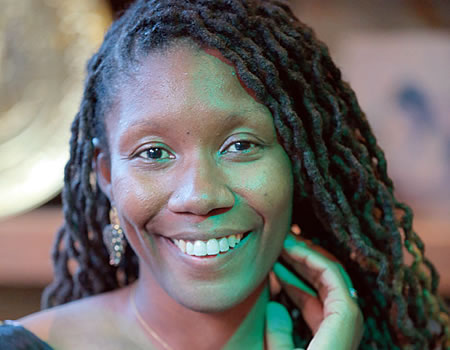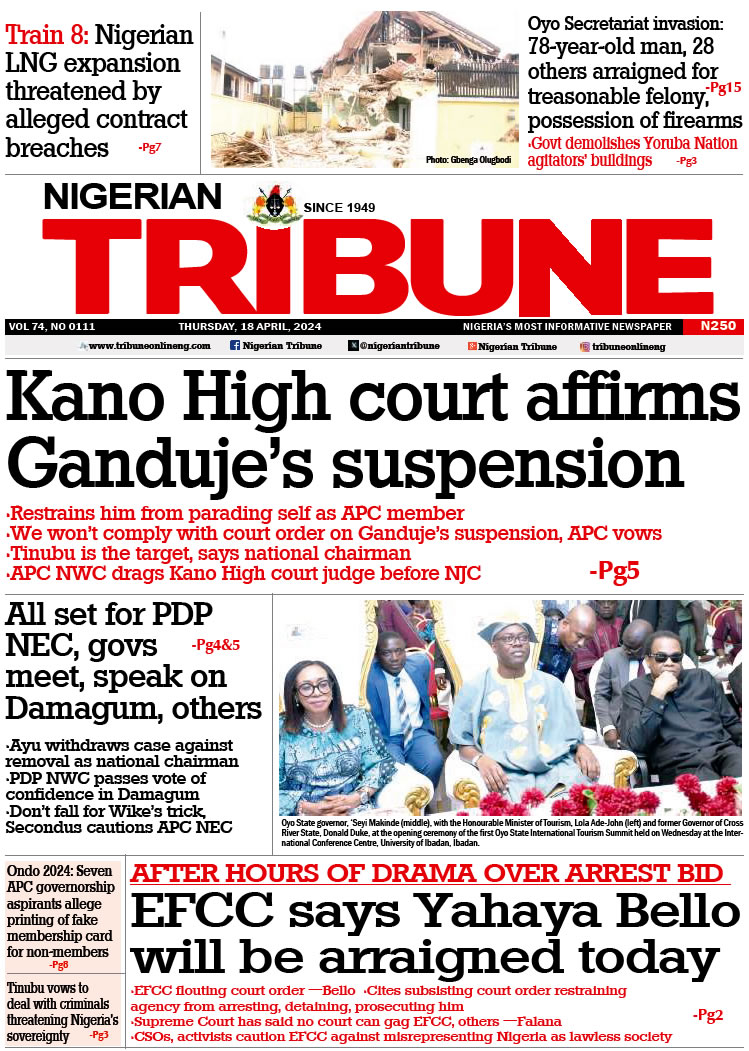Jamaican born, United States-based award-wining writer, Nicole Dennis-Benn, is the founder of Studyvesant Writing Workshop. She is also a lecturer in the creative writing programme at Princeton University. A Cornell University and the University of Michigan graduate, ‘Here Comes the Sun’ (2016) is her debut novel and ‘Patsy’ (2019) is her second novel. In this interview by KINGSLEY ALUMONA, she speaks about her life growing up in Jamaica, her writings and new novel, her sexuality and immigration realities, and her first visit to Nigeria. Excerpts:
BRIEFLY tell us about your life growing up in Jamaica. And, what necessitated your residency in the United States?
I grew up in a small working-class community in Kingston, Jamaica. I had a wonderful childhood, being raised in a place like Vineyard Town where the neighbours were friendly and where we had big yards with fruit trees and lots of space to play as children. I never knew I was working-class until I got a scholarship to an elite all-girls high school. It was then that I became more aware of colourism and classism. I realised that if I wanted to be upwardly mobile and do better than my parents, then I had to leave the island. I was also highly aware of my attraction to women and knew I could not act on my attraction there.
APC is not losing out in Osun — Jayeola
You have a bachelor’s in Biology and Nutrition, and a master’s in Public Health. What inspired you to be a writer?
I always wanted to be a writer—I just didn’t know how it would benefit me and supplicate my yearning for upward mobility. I came to America to be successful. At the time, I thought success meant being a doctor. So, I studied biology and nutrition with the intention of going to medical school. I ended up doing public health since it was a prelude to medical school. By then I had intended to go the PhD route. However, I met a woman who I fell in love with. She noticed that I was spending majority of my time writing. When she read what I wrote, she suggested that I apply to MFA programmes. I ended up finding my passion and stuck with it.
Are you more fulfilled as a writing teacher than as a public health practitioner?
I consider them to be the same thing. As a public health practitioner, I was able to help people by presenting them with research that aided interventions that could improve their quality of life. I was also working to reduce certain stigmas, which proved detrimental to their health. As a writer, I still consider myself to be helping people by empowering them with reflections of the human experience on the page. When they read, they are not only challenging themselves to transcend their own preconceived notions of the world, but also to empathise with others. My writing students learn to tell their own stories. What I learn from being in both health and literary industries is the importance of taking control of our own narratives.
Briefly tell us about your new novel ‘Patsy’. How is it faring in the market?
‘Patsy’ is a story about a woman trying to find her place in the world. She migrates to America, hoping to rekindle a romance with her childhood best-friend and love the way she wants to love. Patsy leaves her daughter behind in this quest for selfhood, acknowledging that motherhood is not for her. The story also follows Patsy’s daughter, Tru, back in Jamaica, who comes of age questioning her mother’s abandonment while coming into her own identity. I’m really happy about the reception the book has gotten thus far. It’s been lauded by NPR, Time, The New York Times, Washington Post, The Atlantic, People, Entertainment Weekly, Vogue, Harper’s Bazaar, Oprah Magazine, Bustle, to name a few.
What is your writing process like? And, how do you handle criticism regarding your work, especially the ones that deal with queer and immigrant realities?
I write often. It’s my career now. So, I exercise discipline by showing up to my workspace, even if I don’t feel like it. I push myself and work hard. I know that as a writer of colour, perched on the margins, my voice and my stories matter. If I don’t tell them, who will? Therefore, when I sit down to write, there is always urgency. In terms of criticisms of my work, I simply shrug and say I write the stories I want to write—stories I want to read; stories I never saw on the page growing up as a working-class Jamaican girl, craving to see herself and her experiences.
In your recent BuzzFeed article titled ‘The Burden Of Being A First-Generation Immigrant’, you wrote, “I learned very early that to be an immigrant in this country meant I didn’t have the luxury of choosing what I wanted, only what was necessary. Do you currently hold this view and why?
I still hold this view. The first thought on every immigrant’s mind is survival in a new country and working toward upward mobility. Pursuing one’s passion, in particular, the arts, is a luxury. In school I knew I didn’t have any other choices besides studying medicine. It was what I, a first-generation college student and first-generation immigrant, was told would give me a glimpse of the American Dream. It took years for me to unlearn that. But I could only unlearn it with the privilege I had, being married to someone who made more money than I did and who was able to say, “Go do your thing.” Not many people get that opportunity.
Do you feel comfortable as an immigrant writer under President Trump’s government? And, have you been, in any way, discriminated against because of your skin colour or sexuality in the U.S.?
There is something called micro-aggression. I never knew this term or that it existed until several years living in America. I never knew I was black until I migrated to the United States. Race is everything here. I’ve experienced homophobia as well. I wrote about this in a New York Times article titled “Who is Allowed to Hold Hands”. I live in Brooklyn, which has a lot of Caribbean and African immigrants, so I face the same looks and comments in New York while holding my wife’s hand in our neighbourhood. But this is a neighbourhood where we are surrounded by our culture. So, it’s complicated.
What is your impression about Nigeria? If you were to visit the country, where would you like to visit and what would you like to do?
I visited Nigeria last year, in 2018, for Ake Arts and Book Festival. I was on a panel with Man Booker Prize winner, Paul Beatty, moderated by Tolu Daniel. Paul and I had a wonderful conversation about craft. I love Lagos because it reminds me of Kingston—the people, the traffic, the heat. If I blinked, I thought I was back home in Jamaica, except I was surrounded by Nigerians. It was very obvious to me then how much we are connected. People in Lagos thought I was Nigerian and I never corrected them. I’m very excited to be invited back this year. I’d love to visit Kalakuta Republic Museum since I’m a huge Fela Kuti fan.
What are you currently working on? And, what do you like doing at your leisure?
I am working on my third novel. I won’t get into the details of that, but I’m very excited about it. For leisure, I love reading and going to museums. I get inspiration from visual artists. Kehinde Wylie, Ebony G. Patterson, Wangechi Mutu, Kudzanai Chiurai, Mary Sibande, Kellyann Lindo, and Carrie Mae Weems are some of the artists whose works are in conversation with mine.
What advice do you have for young people, especially the female ones, who are aspiring to be like you?
I would tell aspiring writers to stay true to themselves, know their worth, and know that their stories matter. This advice is for anyone, not just females.



